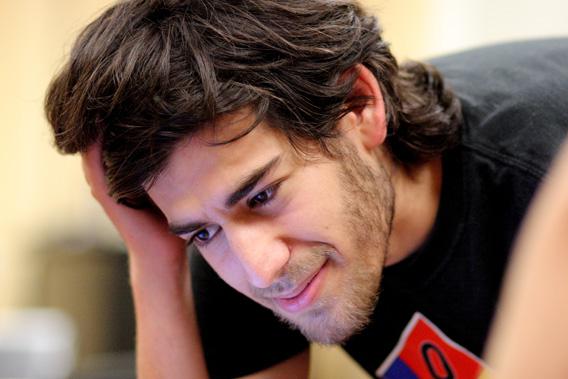Crime is Slate’s crime blog. Like us on Facebook, and follow us on Twitter @slatecrime.
After Internet activist Aaron Swartz committed suicide on Jan. 11, 2013, many observers blamed MIT for its role in encouraging—or, at least, failing to actively discourage—the U.S. Attorney’s Office from prosecuting Swartz for using the school’s computer network to download millions of documents from the academic database JSTOR. (For a primer on the Swartz saga, read my comprehensive Slate piece from February, “The Idealist.”) Earlier this year, in response to these criticisms, MIT President L. Rafael Reif convened an independent panel to examine the university’s role in the sequence of events that may have led to Swartz’s death. The three-member panel was chaired by Hal Abelson, an MIT professor who sits on the boards of Creative Commons and the Free Software Foundation, and a man favorably disposed toward many of the concepts Swartz believed in.
Last week the panel submitted its final report. It is not the scathing indictment that many were hoping to see—Swartz’s girlfriend, Taren Stinebrickner-Kauffman, has called the report a “whitewash.” I don’t think it’s a whitewash. The report is comprehensive, and I don’t get the sense that anything has been elided to make the school look better.
That said, I don’t agree with the report’s overall sentiment. While it does not entirely exonerate MIT, it ultimately accepts the university’s decision to remain neutral on the matter of Swartz’s prosecution. I think that MIT could have fulfilled its institutional priorities—among them “respecting its contractual agreements with licensors” and “maintaining the integrity of its network”—while still signaling that a felony prosecution in the Swartz case was inappropriate. By acting as Switzerland, MIT didn’t do itself, Aaron Swartz, or anyone else any favors.
The MIT report contains a lot of information about the case that had not yet been revealed, and I’ll follow up on some of those specific details as the week goes on. For now the main takeaway is the report’s contention that MIT decided to remain neutral from very early on in the case, and that “MIT’s decisions were mostly guided by this posture of neutrality”:
1. With regard to substance, MIT would make no statements, whether in support or in opposition, about the government’s decision to prosecute Aaron Swartz, the government’s decisions about charges in an indictment, or any possible plea bargain stances of the prosecution or the defense.
2. With regard to legal procedure, MIT would treat both federal law enforcement and Aaron Swartz’s defense team similarly for the purpose of providing documents and making employees available for interviews.
Why did the university decide to remain neutral? Swartz wasn’t an MIT student or an affiliate, for one, and, as such, MIT had no real incentive to treat the matter as a family affair. As the report puts it:
Aaron Swartz had used MIT’s premises and network to allegedly commit crimes, he had adversely affected MIT’s relationship with JSTOR, and he had seriously inconvenienced MIT’s Libraries, MIT researchers, and students seeking to use JSTOR, and MIT’s IS&T personnel who repeatedly tried to stop his misuse of MIT’s network. MIT felt no sense of obligation toward someone who had abused the open access privileges it had provided for the convenience of guests, even if that abuse was carried out in the name of open access.
For another thing, MIT wasn’t a party to the case against Swartz, which was brought by the U.S. Attorney’s Office; the report notes that “MIT itself as an institution only rarely takes a position in a lawsuit to which it is not a party.” What’s more:
One of the reasons for MIT’s silence was the goodfaith belief, based on private conversations with the lead prosecutor, that the Institute’s opinion would have no effect on the prosecution, and that public statements might make circumstances worse for Aaron Swartz.
From what I know about Stephen Heymann, the lead prosecutor in question, this may indeed be true. Another point from the MIT report: “there seemed to be little interest in the case from students or faculty or the larger MIT community.” This last point is an important one. Given all the attention that Swartz has received in the months since his death, it might seem like the Swartz case was always a high-profile matter. But as the report points out, “Until the suicide of Aaron Swartz, the MIT administration treated the case as one of many issues it was addressing, not as an issue of central importance. Similarly, the MIT community did little to draw the administration more deeply into the case.”
Take all these points together, and you can come up with a justification for MIT’s inaction in the Swartz case—namely, that MIT shouldn’t have been expected to act differently than it did. But is that justification worth anything? Like many top universities, MIT styles itself as an intellectual leader. But you can’t be a true intellectual leader without acting thoughtfully in important situations. Even though MIT’s community may not have recognized the importance of the Swartz case, MIT’s brain trust should have realized that it went to the heart of so many issues critical to the tech world for which it is a standard-bearer. By taking a stand on the Swartz case, the institute could have helped lead a national discussion on these issues. Instead, it chose inertia. That might not constitute active negligence or malice on its part. But it’s still a huge missed opportunity, and one the school shouldn’t be proud of.
